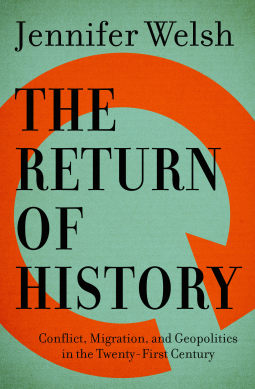Please wait... This may take a moment.
The Return of History
Conflict, Migration, and Geopolitics in the Twenty-First Century
This title was previously available on NetGalley and is now archived.
Pub Date
Oct 11 2016
| Archive Date
Sep 19 2016
Description
In 1989, as the Berlin Wall crumbled and the Cold War dissipated, the American political commentator Francis Fukuyama wrote a famous essay, entitled “The End of History.” Fukuyama argued that the demise of the confrontation between Communism and capitalism, and the expansion of Western liberal democracy, signaled the endpoint of humanity’s sociocultural and political evolution, the waning of traditional power politics, and the path toward a more peaceful world. At the heart of his thesis was the audaciously optimistic idea of “progress” in history.
But a quarter of a century after Fukuyama’s bold prediction about transcending the struggles of the past, history has returned. The twenty-first century has not seen unfettered progress toward peace and a single form of government, but the reappearance of trends and practices many believed had been erased: arbitrary executions, attempts to annihilate ethnic and religious minorities, the starvation of besieged populations, invasion and annexation of territory, and the mass movement of refugees and displaced persons.
This book will both illustrate and explain this return of history, and it will also argue how the reappearance of things deemed “barbaric” or “medieval” has a modern twist.
In 1989, as the Berlin Wall crumbled and the Cold War dissipated, the American political commentator Francis Fukuyama wrote a famous essay, entitled “The End of History.” Fukuyama argued that the...
Description
In 1989, as the Berlin Wall crumbled and the Cold War dissipated, the American political commentator Francis Fukuyama wrote a famous essay, entitled “The End of History.” Fukuyama argued that the demise of the confrontation between Communism and capitalism, and the expansion of Western liberal democracy, signaled the endpoint of humanity’s sociocultural and political evolution, the waning of traditional power politics, and the path toward a more peaceful world. At the heart of his thesis was the audaciously optimistic idea of “progress” in history.
But a quarter of a century after Fukuyama’s bold prediction about transcending the struggles of the past, history has returned. The twenty-first century has not seen unfettered progress toward peace and a single form of government, but the reappearance of trends and practices many believed had been erased: arbitrary executions, attempts to annihilate ethnic and religious minorities, the starvation of besieged populations, invasion and annexation of territory, and the mass movement of refugees and displaced persons.
This book will both illustrate and explain this return of history, and it will also argue how the reappearance of things deemed “barbaric” or “medieval” has a modern twist.
A Note From the Publisher
The Pub Date for CANADA is September 17, 2016. The Pub Date for USA is October 11, 2016.
The Pub Date for CANADA is September 17, 2016. The Pub Date for USA is October 11, 2016.
Available Editions
| EDITION |
Hardcover |
| ISBN |
9781487001308 |
| PRICE |
$24.95 (USD)
|
Additional Information
Available Editions
| EDITION |
Hardcover |
| ISBN |
9781487001308 |
| PRICE |
$24.95 (USD)
|
Average rating from 1 member




